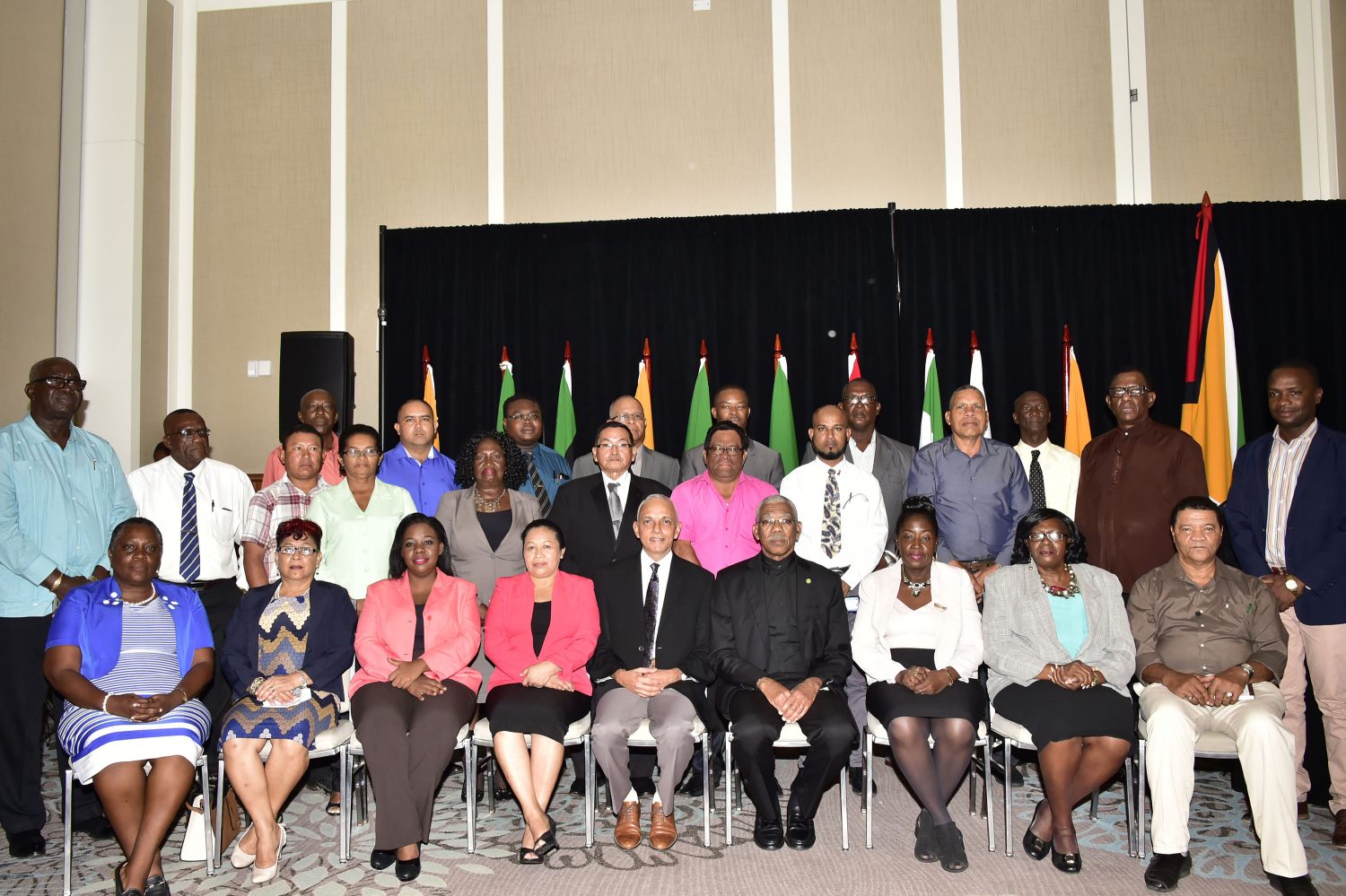The Ministry of Communities yesterday hosted the second annual meeting of the National Regional Development Consultative Committee (NRDCC), which was once again marred by the absence of representatives from those regional councils controlled by the opposition People’s Progressive Party/Civic (PPP/C) and President David Granger called it administrative sabotage.
The meeting was hosted under the theme “Strengthening regional governance through leadership and human resource development.”
During the opening of the meeting, Minister of Communities Ronald Bulkan hailed the committee as a step towards increasing the efficiency of regional administration structure and advised those Regional Democratic Council (RDC) Chairpersons who were absent that they could either participate or be left out.
According to Bulkan, the strengthening of regional pride and ownership will not be held hostage by recalcitrance.
The RDCs, he stressed, “will either lead, follow or stand aside” when it comes to the NRDCC, which is to be an established conduit and key platform for discussions among national, regional and local leaders.
Bulkan was at the time referring to the Chairpersons of those PPP/C-led RDCs who had for the second year failed to attend the event without providing excuse. The minister noted that the only excuse was received from the Chair of Region Five.
Stabroek News has been able to confirm that Regions Two, Three and Six were also absent as were the Mayors of Rose Hall, Anna Regina and Corriverton. Notably, the Region Ten chairperson was also absent as was Mayor Patricia Chase-Green of Georgetown.
President Granger, who delivered the feature address, also spoke of the absences and noted that the lack of participation is “nothing less that administrative sabotage.”
“When regional chairmen refuse to attend important governmental functions like this, we can see where divisionism starts,” he noted before adding that the NRDCC is an important step towards strengthening the system of modern and appropriate public administration.
He reiterated that RDCs are required to work with municipalities, Neighbourhood Democratic Councils (NDCs), Village Councils and other stakeholders to promote the development of their respective regions, including the supervision of the work of NDCs and Village Councils,
giving them support and assistance where needed.
“We see each region developing the capability of attracting investors to encourage commerce with the Caribbean and other parts of the world and developing thriving business districts, industrial parks, busy highways and bustling stellings,” he said, before adding that a rich country cannot be built on poor regions.
Bulkan told those gathered that his ministry was pleased to host the event in pursuit of the strategic direction of the governing administration, which includes the decentralisation of government and renaming of the administrative regions.
Referencing the 1980 State Paper on the re-organisation of the Local Government System in Guyana, the minister noted that the regions were created for management and development.
“They are not appendages of central government but are meant to exist in a symbiotic relationship…as the constitution established mechanisms to permit central and local government to integrate and harmonise in a symbiotic relationship,” he explained.
He stressed that the NRDCC, which will serve as a mechanism for coordinating the developmental agenda of all three spheres of government, is a step towards increasing the efficiency of the regional administrative structure to support the bottom-up approach to democratic governance.
Since the principal function of the NRDCC will be to facilitate collaborative financial planning and administration, it will allow for more accountability, more transparency, and more partnership among key stakeholders, which will aid in the effective delivery of public services throughout Guyana, he argued.
Bulkan further noted that the NRDCC will be a decisive step towards ensuring that the government’s agenda of decentralisation is seamlessly implemented, since it will facilitate networking and allow for regional programmes to be in alignment with the overarching vision and policy of the administration.
The minister stressed that even as this occurs the authority and autonomy of RDCs will be respected, a point he claimed the opposition is either not listening to or uninterested in.
He made specific reference to the 2018 budget debates, during which opposition chief whip Gail Teixeira referred to the NRDCC as a sinister body which usurps power of the RDCs.
According to Bulkan, these statement were “sad and irresponsible.”
Yesterday’s opening of the one day event was followed by a Business Session during which regional representatives were required to, among other things, detail policy directions and plans for the development of their respective councils for the year.






